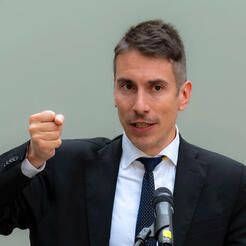December 7, 2022 (12:00 - 1:00 pm ET)
 |
Christian Greco
(Museo Egizio di Torino, Italy)
Title: Digital Revolution and Humanism
Abstract:
Today we find ourselves immersed in what is called the digital revolution, which has already profoundly transformed our cognitive approach and working methods. In archaeology, photogrammetry and 3D modelling enable archaeologists to document the whole excavation process and reconstruct contexts even after they have been removed. We can reproduce a coffin with sub-millimetric accuracy by recording all its phases of production and reuse. Non-invasive diagnostic imaging enables us to peer inside a still sealed vessel and virtually unwrap the mummies. Accurate analysis now gives scholars the opportunity to observe the fibres of a papyrus, helping us recompose ancient documents. Then digital communication enables us to create virtual working environments in which scholars from all over the world can confer and compare their data. All this facilitates and accelerates the work of scholars. Does this mean that the humanist’s role is becoming secondary? Quite the contrary. The data we glean is increasingly detailed and complex and requires an even greater level of interpretation. The scientist and the humanist have to work together even more closely to try and unravel the complexity of the contemporary world. This increasing collaboration goes beyond the dogmatisms of individual knowledge. The definition of a shared semantics and the development of a true multidisciplinary approach are the only method we have to cope with the challenges of the future. And in all this, what will the role of the museum be? Are these institutions destined to disappear? We must not forget that in rethinking the role that museums can have in the future, we have at the same time to bear in mind the main reason why they were founded, namely as a place where objects from the past could be preserved. And, despite all the changes we have seen, it is undeniable that the core of the museum experience continues to be that of seeing artworks, archaeological remains or documents of social history. The changes will continue. We will think of different organisational and architectural solutions responding to contemporary needs. There will certainly also be new forms of cultural enjoyment. Our task, however, will always be to improve the visual, aesthetic and intellectual experience of every visitor who comes face to face with a piece of the past, and to provide all the information necessary to enrich their understanding. So the future of museums is, as it has always been, research.
Register here to attend On-line: Click here to register
For more information please contact vincent.morel@yale.edu
